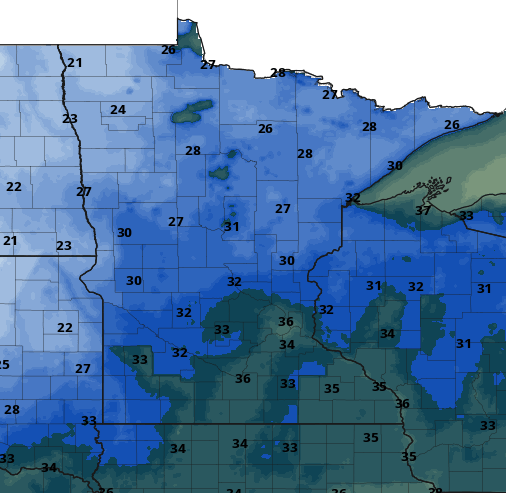Colder and windy Thursday; drought expands in latest drought monitor
Little or no rain continues the dry pattern

Go Deeper.
Create an account or log in to save stories.
Like this?
Thanks for liking this story! We have added it to a list of your favorite stories.
Blustery north winds will push temperatures down from the 50s into the 40s across southern Minnesota and keep temperatures in the 30s and 40s in northern Minnesota Thursday. Frost will be widespread outside of the Twin Cities Thursday night. In the latest drought monitor, drought expands.
Temperatures tumble Thursday on north winds
Cold air is blowing in across Minnesota with blustery north winds at 10-25 mph Thursday. Gusts will be 25 to 40 mph. High temperatures will be in the 40s in northern Minnesota and in southern Minnesota the high temperatures are behind us. We’ll see temperatures slowly drop through the 50s into the 40s by evening in the Twin Cities.

Thursday night will see widespread freezing temperatures in northern Minnesota and frost south, but mainly outside of the Twin Cities.

High temperatures Friday will be chilly, only in the 40s to around 50 for some in southern Minnesota but with sunshine and lighter winds.
Turn Up Your Support
MPR News helps you turn down the noise and build shared understanding. Turn up your support for this public resource and keep trusted journalism accessible to all.

Friday night will bring more widespread freezing temperatures and we could get closer to frost potential in Minneapolis-St. Paul proper where we have yet to see it.

By next week, we’ll see warmer temperatures, near 70 again Tuesday.

Latest drought monitor shows extreme drought for the first time this year
The drought expands across Minnesota in the latest U.S. drought monitor. Extreme drought now shows up for the first time this year and includes 4 percent of Minnesota. Severe drought expanded from 4 percent last week to now 11 percent of Minnesota. Drought overall expanded from 22 percent to now 35 percent of Minnesota.

In the Twin Cities, we’re behind -8.28 inches for the year. September was the driest on record with only 0.24 inches of rainfall.
Dear reader,
The trustworthy and factual news you find here at MPR News relies on the generosity of readers like you.
Your donation ensures that our journalism remains available to all, connecting communities and facilitating better conversations for everyone.
Will you make a gift today to help keep this trusted new source accessible to all?




